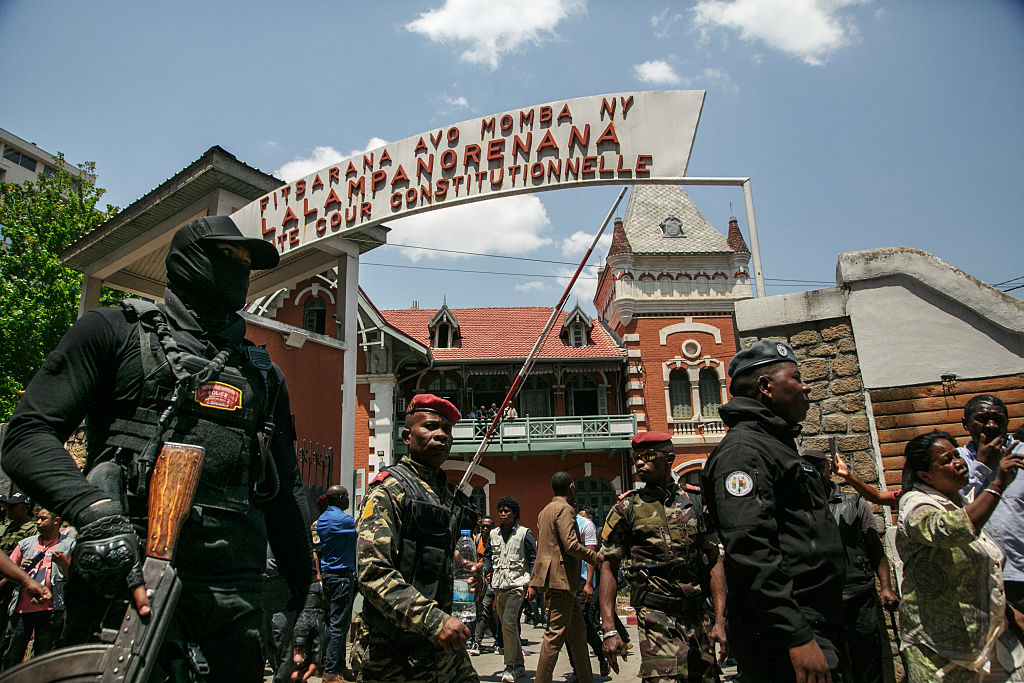There have been 11 successful coups on the continent since August 2020, when Malian military officers arrested President Ibrahim Boubacar Keita at gunpoint and forced him to resign.
The most recent coup was on October 12, when Malagasy President Andry Rajoelina was ousted after weeks of protests led by young people upset by power and water failures, grinding poverty, a lack of opportunities and alleged government corruption. Rajoelina’s office issued a statement calling the coup “a serious breach of the rule of law.” Col. Michael Randrianirina, who led the coup, was sworn in as Madagascar’s president on October 17.
In response, the African Union suspended Madagascar’s membership to the organization. AU chairperson Mahmoud Ali Youssouf condemned any unconstitutional change of government, pushed for a coordinated AU, Southern African Development Community (SADC)-Indian Ocean Commission response and a fact-finding mission.
“The rule of law must prevail over the rule of force,” Youssouf said. “Our approach is grounded in law and dialogue.”
AU suspensions are almost always a response to a the government being overthrown in a member country, according to Political Geography Now, a website that tracks and reports on changes in the world’s political geography. The AU’s response has drawn criticism from analysts such as Fidel Amakye Owusu, a security analyst specializing in African affairs and geopolitics, who told German news service Deutsche Welle (DW) that the bloc’s protocol that regulates events relating to coups is reactionary rather than proactive.
Ryan Cummings, director of analysis at Africa-focused risk management company Signal Risk, said he believes suspensions have become the AU’s only mechanism in addressing “undemocratic acts.”
“The African Union’s suspension of Madagascar with respect to the unconstitutional power grab that has taken place speaks to the limited mechanisms that the Pan-African body has at its disposal to ensure that there is some form of accountability or repercussions,” Cummings told DW.
Analysts at the Institute for Security Studies in 2023 wrote that AU suspensions can change the behaviors of defaulting member states and promote collective norms. For years, these sanctions and the AU’s zero-tolerance-for-coups policy seemed effective, as two waves of declining continental coups were recorded in the 1990s and between 2000 and 2019. However, sanctions implemented against Burkina Faso, Mali and Sudan in recent years did not prevent the repetition of coups in those countries, nor did they prevent subsequent coups in Gabon, Guinea, Madagascar and Niger.
“It is clear that AU and REC [regional economic communities] responses to the current wave of UCGs [unconstitutional changes of governments], have yet to achieve the intended objective,” Institute analysts wrote. “Sanctions have failed to change behavior and deter disregard for democratic norms.”
Institute analysts wrote that the AU should deploy preventive measures, such as fact-checking missions, to determine whether constitutional amendments could be considered based on early warning indicators about any unconstitutional changes, not just coups. Cummings, however, said sovereignty is one of the AU’s key tenets, and it will not intervene in any issue in the absence of a formal request.
“Even if it is invited to do so, it will weigh the consequences of its actions,” he told DW. “If its actions could lead to more instability, it will probably just limit its intervention to dialogue.”
In Madagascar’s case, the AU issued an October 12, 2025, statement urging dialogue among protesters, Rajoelina’s government and security forces after the military lent its support to the young protesters. It urged “all Malagasy stakeholders, both civilian and military, to exercise calm and restraint,” the AU said.
Security analyst Owusu said the AU is hamstrung by what it can do to prevent coups and suggested the intervention of the SADC, of which Madagascar is a member. The regional economic bloc often plays a key role in mediation and stabilization. However, Owusu believes “there is little any group could do to change course in the short term.”
“Much will depend on the public,” he told DW. “They started this and they could direct where it goes.”

